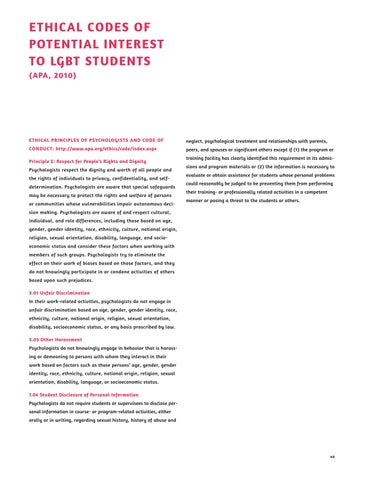ETHICAL CODES OF POTENTIAL INTEREST TO LGBT STUDENTS (APA, 2010)
ETHICAL PRINCIPLES OF PSYCHOLOGISTS AND CODE OF
neglect, psychological treatment and relationships with parents,
CONDUCT: http://www.apa.org/ethics/code/index.aspx
peers, and spouses or significant others except if (1) the program or
Principle E: Respect for People’s Rights and Dignity Psychologists respect the dignity and worth of all people and the rights of individuals to privacy, confidentiality, and selfdetermination. Psychologists are aware that special safeguards may be necessary to protect the rights and welfare of persons or communities whose vulnerabilities impair autonomous deci
training facility has clearly identified this requirement in its admis sions and program materials or (2) the information is necessary to evaluate or obtain assistance for students whose personal problems could reasonably be judged to be preventing them from performing their training- or professionally related activities in a competent manner or posing a threat to the students or others.
sion making. Psychologists are aware of and respect cultural, individual, and role differences, including those based on age, gender, gender identity, race, ethnicity, culture, national origin, religion, sexual orientation, disability, language, and socio economic status and consider these factors when working with members of such groups. Psychologists try to eliminate the effect on their work of biases based on those factors, and they do not knowingly participate in or condone activities of others based upon such prejudices. 3.01 Unfair Discrimination In their work-related activities, psychologists do not engage in unfair discrimination based on age, gender, gender identity, race, ethnicity, culture, national origin, religion, sexual orientation, disability, socioeconomic status, or any basis proscribed by law. 3.03 Other Harassment Psychologists do not knowingly engage in behavior that is harass ing or demeaning to persons with whom they interact in their work based on factors such as those persons’ age, gender, gender identity, race, ethnicity, culture, national origin, religion, sexual orientation, disability, language, or socioeconomic status. 7.04 Student Disclosure of Personal Information Psychologists do not require students or supervisees to disclose per sonal information in course- or program-related activities, either orally or in writing, regarding sexual history, history of abuse and
49


